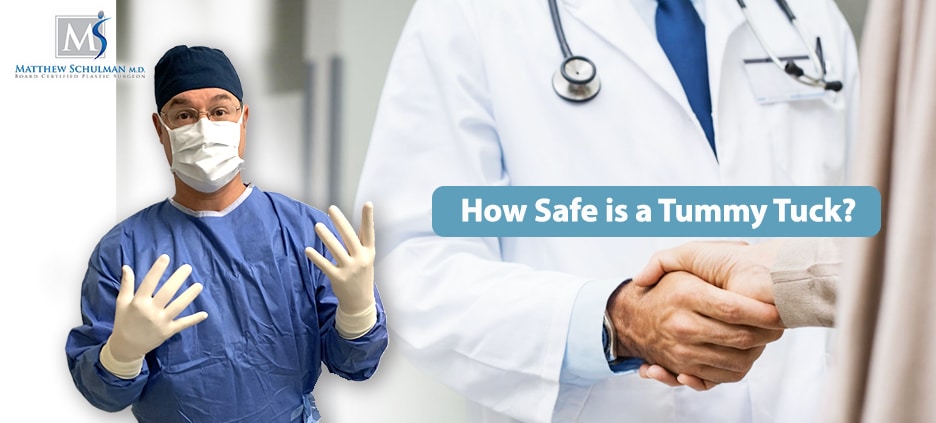A tummy tuck — also known as abdominoplasty — improves the appearance of your entire midsection. Excess skin is removed, the underlying abdominal wall muscles are tightened, and the procedure even gets rid of hard-to-lose fat.
But how safe is this cosmetic surgery really? Is a tummy tuck procedures dangerous? How do I know if I need a tummy tuck?
Here’s where it’s important to look at the facts. And we’ll do that in just a moment. But first — let’s quickly get our bearings and go over what you can expect during and after tummy tuck surgery.
What Is a Tummy Tuck?
A tummy tuck is a major surgical procedure that slims and smooths the abdomen, removing the excess fat and skin and tightening the abdominal muscles in the process. The procedure involves general anesthesia (being put under for surgery by an anesthesiologist), incisions made in the abdomen, and a substantial recovery period.
The surgery itself varies from patient to patient. Generally speaking, however, most tummy tuck are performed as follows:
First, you will be put under general anesthesia via an IV. Next, your plastic surgeon will make two incisions:
- One on the lower abdomen, beneath the bikini line, from one hip to the other
- One around the belly button
The abdominal skin will then be lifted, and the abdominal muscles will be manipulated and tightened for an ultimately smoother and sleeker tummy. Liposuction will be performed if necessary. The abdominal skin will then be gently pulled down, and the excess fatty tissue will be cut off. The belly button will be repositioned, and the incisions will be carefully closed.
You will then be taken to a recovery room where you will stay for a few hours, and after that you will be allowed to go home. At home, you’ll have several weeks of intense recovery during which time you will not be able to exercise, lift anything heavy, or really do any activity other than rest and take care of yourself.
Even after this initial recovery period, you will have several more months where you’ll need to take it easy. With guidance from your surgeon, you will slowly be able to reintegrate your normal activities back into your daily life.
Is a Tummy Tuck Safe?
When headlines and news stories stir up concern about the safety of plastic surgery procedures like tummy tuck, patients get worried. They may have been all-in for the procedure at one point, but suddenly, they have misgivings. They want to know: “Is a tummy tuck dangerous? Is a tummy tuck safe?”
Generally speaking, yes, tummy tuck surgery is safe. With that said, there are inherent risks whenever any type of surgery is performed, and this includes tummy tucks.
Again, we must turn to the Tummy Tuck facts.
First, there’s always a risk when incisions are made during surgery. It is extremely rare, but in some cases, an incision may end up opening up during the recovery period or not healing well in a poor wound healing in general. Ongoing bleeding is another risk. Though, again, it is extremely rare.
Fluid collection (seroma) in remaining skin is another risk. However, this is also a rare complication because drains will be placed below the patient’s incisions to allow excess fluid to drain out during recovery. There is also the risk of infection (as with any surgery), but antibiotics administered both during and after surgery are reliably good at preventing this.
Finally, blood clots (or deep vein thrombosis/DVT) are another serious risk, but again, this is the case with any abdominal surgery including C-sections, hysterectomies, and abdominoplasty. Surgeons also have preventive strategies in place to avoid DVT, including the use of SCDs (sequential compression devices to promote circulation), anticoagulants, compression garments, and more.
It is always recommended that patients ambulate (get up and moving) as soon as possible after their tummy tucks, which can also help prevent clots from forming. This does not mean you’ll be running sprints! Rather, you should stand up frequently and take a few slow walks around your house as soon as you are able.
Tummy Tuck Procedure Aren’t for Everyone
Part of determining the safety of tummy tuck surgery for a given patient is looking at their general health. Not every patient is a good candidate for a tummy tuck or mini tummy tuck. Is a tummy tuck safe for someone with a chronic illness like diabetes or high blood pressure, for instance? Most likely, no. Patients with chronic illnesses are often at higher risk for complications when it comes to a surgery.
Likewise, certain lifestyle choices may preclude you from surgery for your own safety. Patients who smoke and cannot stop for a duration before and after the procedure, for example, will not be cleared for surgery.
In the end, if you’re still not sure if a tummy tuck is right for you, that’s okay! This is where going to a quality plastic surgeon is important. Before committing to this procedure or any other, it is your prerogative — and, certainly, it is in your best interest — to do your research, ask questions, and take some time to weigh your options.
Ultimately, if you do decide to move forward with tummy tuck surgery, the best way to ensure your safety during this procedure is to choose a plastic surgeon who’s board-certified and has extensive experience.
Dr. Matthew Schulman is board-certified and has been performing successful tummy tucks in New York City for over twenty years. His experience, combined with his expertise and professionalism in the field of plastic surgery make him the ideal surgeon for your upcoming tummy tuck.
Dr. Schulman is also one of the most sought-after plastic surgeons in New York City because of the care and attention he gives to each and every patient. Even if you’re still on the fence about tummy tuck surgery, Dr. Schulman is a great resource. He would be happy to speak with you about your options and answer all of your questions at a consultation appointment.
It’s good to be curious about the safety concerns surrounding typical tummy tuck procedure before deciding to move forward with this procedure. Being curious and using your resources to find the answers to your questions is a great way to get the facts straight and make the right decision for you.
Questions and Answers
What is the risk rate of a tummy tuck?
In general, a tummy tuck resulted in major complications for approximately four percent of patients, which is significantly higher compared to the 1.4 percent rate observed in other cosmetic surgery procedures.
Why do I have excess skin after a tummy tuck?
During a tummy tuck, the excess skin removed should not regenerate. However, it’s important to note that body contouring procedures cannot guarantee immunity against all unwanted changes in your appearance as time goes on. Instances like weight gain significant weight loss or pregnancy might lead to the skin stretching out again even after a tummy tuck.
Can a tummy tuck cause problems years later?
Frequently observed early tummy tuck risks or complications, occurring within a month, encompass hematoma, seroma, local infections, skin or fat necrosis, and wound dehiscence. On the other hand, late complications involve recurrent diastasis, tummy tuck scar hypertrophy, and symptoms associated with nerve injury. A good plastic surgeon will minimize tummy tuck risks.
Book Your Tummy Tuck Surgery Consultation
To find out if you are a candidate for a major surgery like tummy tuck and to learn more about the tummy tuck procedure itself, give our NYC office a call and book your consultation appointment today.
References
https://www.plasticsurgery.org/cosmetic-procedures/tummy-tuck/safety



